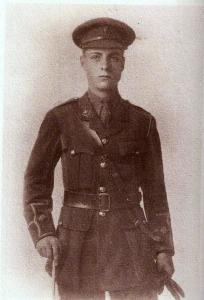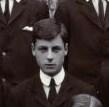
|

|
| 2nd Lieutenant Aubrey Sugden FITCH | |
|
1/4th Battalion Royal Sussex Regiment Date of birth: 30th July 1895 Date of death: 26th March 1917 Killed in action aged 21 Commemorated on the Jerusalem Memorial Panels 26 and 27 |

|
| Aubrey Sugden Fitch was born at Ross-on-Wye in Herefordshire on the 30th of July 1895 the son of Frederick Pardoe Fitch, a Lloyds Bank manager, and Laura Sarah (nee Sugden) Fitch later of “Fairmead”, Shakespeare Road in Worthing. He was educated at Southey Hall School at Worthing and at Lancing College where has in Seconds House from September 1909 to December 1913. He was a member of the Officer Training Corps until December 1913 where he rose to the rank of Lance Corporal and achieved Certificate A. He was entered for Christ's College Cambridge with a view to becoming a clergyman and was due to go there from October 1914 but instead he elected to join the army. Following the outbreak of war he enlisted at Worthing as Private 341 in the 19th (Service) Battalion Royal Fusiliers (2nd Public School, University and Public Schools Corps on the 4th of September 1914. At a medical examination, which was held on the same day, it was recorded that he was five feet seven inches tall, that he weighed 138lbs and that he had a dark complexion, hazel eyes and dark brown hair. He was posted for training to Epsom where he was in D Company and from where he applied for a commission in the 4th Battalion Royal Sussex Regiment on the 11th of January 1915. He was commissioned as a 2nd Lieutenant in the 4th Battalion Royal Sussex Regiment on the 13th of March 1915. He embarked for Gallipoli on the 4th of September 1915 where he joined the battalion in the field, who were in reserve on the southern slopes of Lala Baba, on the 7th of October. On the 23rd of October he and two other officers were sent to the front line for training in trench warfare with the Scottish Mounted Brigade. While on Gallipoli he contracted a fever and then jaundice and was evacuated to hospital in Malta on the 8th of November 1915. He rejoined his Battalion at Wardan in Egypt at the beginning of 1916 where he served until the British advance into Palestine. On the night of the 25th of March 1917 the Battalion marched to Dier El Belah and by 1am on the morning of the 26th they were at the head of the Brigade as they moved forward in the darkness towards the Turkish positions. At 3.45am they crossed the Wadi Ghuzze and reached the El Sire- El Shelluf Ridge at 5am by which time it was getting misty, At 6.45 they were given orders to take El Shelluf which they occupied by 7.55am without incident. At around 8.15am the mist cleared and the Turkish positions could be seen but it wasn’t certain whether or not they were occupied. At midday verbal orders were received to attack and by 12.30pm the advance was underway with the first Turkish trench being taken without opposition. The battalion then advanced across a hollow and onto the crest beyond but heavy fire caused the commanding officer, Lieutenant Colonel Hugh Stirling Ashworth, to order a withdrawal to the hollow; he was killed shortly afterwards. At 4pm the crest was retaken and at 7pm the battalion was relieved by battalions of the Essex Regiment and the Queens (Royal West Surrey) Regiment. The men of the Royal Sussex fell back to assist their casualties. Four officers and twenty four other ranks were killed in this action with ten officers and one hundred and fifty four other ranks being wounded and fifty seven men being listed as missing. His Commanding Officer wrote:- "He met his end gallantly leading his men against severe fire, in an attack on March 26th. He was a really good officer with a plentiful flow of sensible ideas and strong sense of duty." His Company Commander wrote:- "I always had the greatest respect for your son ever since he joined my Company. Such a hard worker and so keen he always had his Platoon in splendid trim; and I hear he met his death as I always knew he would-leading his men. I shall miss him very much as he was always so cheerful and took an interest in his work. One of his men wrote:- "Words cannot tell what we feel at the loss of Mr. Fitch. We all loved him and would do anything for him. He never let us do anything he would not do first himself, He would go to the top of the ridge to see before he let us go, and was hit in the head, he was always like that; we all loved him." His mother applied for his medals in February 1921. |
|
 | |
| Seconds House |
Back